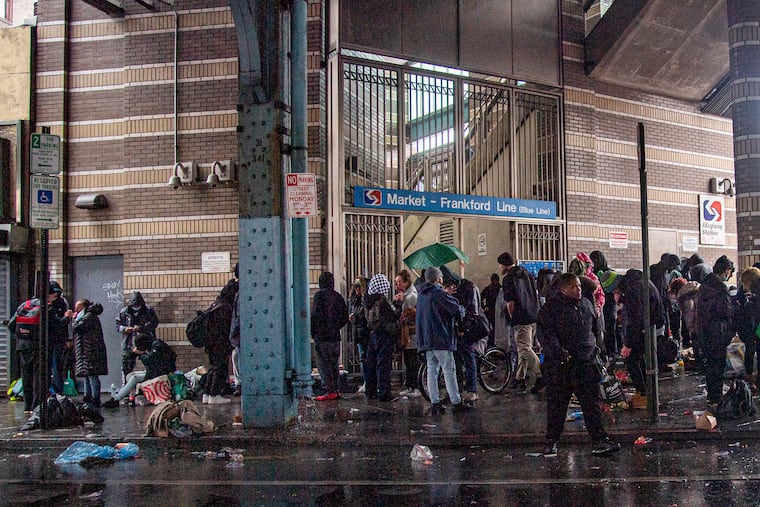Philly City Council members seek emergency declaration over Kensington’s opioid crisis
Kensington residents say they’ve been working together to address problems in the neighborhood, and insist that they must lead any revitalization efforts.

City Council members are calling on Mayor Jim Kenney and Gov. Tom Wolf to declare an emergency over the opioid crisis in the Kensington neighborhood, saying the city needs more state and federal funding to address the community’s needs.
“The people of Kensington, and all citizens of Philadelphia, deserve for their government to take every approach, however novel, to secure resources that will address this humanitarian crisis,” the resolution reads.
Meanwhile, Kensington residents — who have witnessed numerous failed city efforts in their community — say they’ve been working together to address problems in the neighborhood, and insist that they must lead any revitalization plans, though any government funding would be welcome.
At-Large Councilmember Allan Domb wrote the resolution and introduced it with Councilmembers Mark Squilla and Maria Quiñones-Sánchez, whose districts both include parts of Kensington, the neighborhood at the epicenter of the city’s overdose crisis, among the nation’s most grave. Several other members also signed on to the resolution.
The council members’ call comes just three years after the city embarked on an ambitious plan to address Kensington’s homelessness and drug crises. Though city officials initially touted some success, the chaos of the COVID-19 pandemic and the skyrocketing overdoses that followed have largely erased that progress. This week, the neighborhood’s streets and parks were as full as ever of people in crisis.
Domb said in an interview that conditions in Kensington have become “unacceptable,” with widespread open-air drug use and dealing that the city has proven unable to address.
“We have to bring to the table the federal government and the resources they have available to get this situation under control and restore what Kensington was many, many years ago,” he said. In the resolution, he wrote that federal emergency funds could get more people into drug treatment; provide housing and other social services for longtime residents and people experiencing homelessness; and pay for neighborhood cleanups and harm-reduction efforts.
Domb said he would eventually like to see “a special services district in that whole neighborhood that we pay for. We could rebuild commercial activity on the blocks, bring stores, restaurants, and activities in.”
Bill McKinney, a prominent community activist who heads the New Kensington Community Development Corporation, said he and other residents welcome any funding to address the crisis. But, he stressed, community members must lead the planning process.
“We know Kensington is a disaster area. But what should be done should be determined by people who are here every day,” he said. “What has not worked, historically, are city folk, politicians, showing up and going, ‘Here’s the thing [we’ll do].’ And then it goes away, and it doesn’t work, and it creates more harm.”
A city spokesperson wrote in an email that the Kenney administration is “supportive of all attempts to gain additional resources for the city,” but added that “any planning efforts must include authentic community input.” The spokesperson said administration officials plan to speak with Domb and “all other levels of government involved in a declaration of this sort.”
McKinney said that the NKCDC and other community organizations have been working more closely with each other in recent months, galvanized by successful organizing efforts around the closure of the Somerset El station last March. After SEPTA officials announced the station would shut down indefinitely for maintenance — with some repairs needed because of discarded needles and other byproducts of injection drug use in the station — community members staged protests and the station reopened within two weeks.
Lately, McKinney’s organization and others, like the Kensington-based Impact Services, have been working to develop a master plan for the neighborhood, centered on McPherson Square Park and focused on “themes of health and wellness.”
“We’ve gone out and gotten resources — things that range from real estate acquisition dollars to federal programs, to a grant from the Rite Aid Foundation for families and children. We’ve got dollars for programming to activate the hub of Kensington that needs to be stabilized right now.”
McKinney said a coordinated plan, not the kind of piecemeal efforts that have been introduced and abandoned in the neighborhood for decades, is necessary to pull Kensington out of its current situation.
“There’s a lot of people who can really focus on bringing together a lot of different resources,” he said. “We need all the ones that we can, but we need them to be coordinated. And if [declaring a federal emergency] is something someone wants to do — bring it to the table as part of a master plan. But it can’t be driven from the outside.”